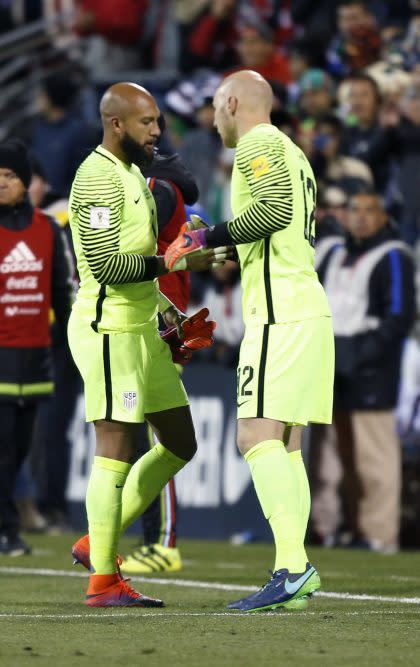With Tim Howard out, Jurgen Klinsmann has a mess of his own making in goal

These are uncharted waters.
Because the line of succession has been linear and clear.
Tony Meola was in goal for the early 1990s, tending to the United States men’s national team’s nets at the 1990 and 1994 World Cups. Then, for a decade or so, followed the Kasey Keller-Brad Friedel duopoly. Keller was the goalkeeper at the 1998 World Cup and also in 2006, Friedel in 2002.
[ Costa Rica vs. USA: Klinsmann must go | U.S. loses 4-0 | Match tracker ]
In 2007, Tim Howard took over the job full-time and held it with great distinction for the 2010 and 2014 World Cups. He remains, at 37, the undisputed starter for the U.S.. After a standout performance in Brazil, with a World Cup record-setting 16 saves against Belgium in the round of 16, he took a year-long sabbatical from the national team. And upon his return, he and his long-time understudy Brad Guzan largely rotated in the job. Guzan was the starter at the 2015 Gold Cup – which Howard didn’t participate in – and the 2016 Copa America Centenario.
Since then, however, the one-time Everton stalwart has reclaimed the job. He has enjoyed a resurgence since returning to Major League Soccer with the Colorado Rapids, while Guzan’s playing time has withered at Middlesbrough after a long and mostly successful spell at since-relegated Aston Villa.
But now, ahead of a crucial World Cup qualifier with Costa Rica on Tuesday, Howard is injured. He hurt his right adductor on a 40th-minute goal kick during the 2-1 loss to Mexico on Friday and will be out four months. Which means Guzan will surely start in his place.
Yet the latter isn’t a regular for his club and had not played a minute of competitive soccer since Aug. 28 when he replaced Howard. Guzan certainly deserves more playing time and a chance to add to his 52 caps for faithfully and happily backing up Howard for a decade, but with all the goodwill in the world, a goalkeeper who hasn’t gotten regular minutes in 2½ months is a liability.
This, then, is a first. When Meola was nearing the end of the line, Keller and Friedel were aching to step in. Howard, something of a prodigy coming up with the New York MetroStars and a Manchester United player several years before he became a national team regular, was clearly the answer to their inevitable retirement.
But now Howard is coming to the final stops of his laureled career, and the picture of his succession is murky. He may well hang around until Russia 2018, or he may not because of some combination of poor health, diminishing abilities and a faith abandoned by head coach Jurgen Klinsmann, or whoever else might be in charge. Guzan, at 32, is young enough to handle the remainder of this World Cup cycle, and with good luck a second one as well. His club situation, however, is iffy. He may not start for Middlesbrough again. He may struggle to find another job at an elite club.

And, again, he’s 32.
So what, or who, next?
Klinsmann’s big thing is making younger players push out the older ones. He blames the relative homeostasis in the senior team on the next generation’s inability to make their elders obsolete, even as plenty of regulars have cruised well past age 30.
This sounds good in the abstract, but in practice, it’s a senseless kind of policy. How, after all, do you mature into a fully-fledged national teamer with a strong claim on a starting job without getting to start regularly on the national team? A dearth of opportunity is especially damaging to goalkeepers, since there can be only one out on the field.
Klinsmann has steadfastly refused to give younger goalkeepers extended runs between the posts. More grievously, he stuck with Nick Rimando as his third goalkeeper throughout the 2014 World Cup cycle. Rimando is the same age as Howard and, while deserving of national team recognition for a stellar career in MLS, basically blocked off an apprentice job of sorts for younger players who might have contributed down the line. At the 2013 Gold Cup, Rimando was even the first-choice goalkeeper as a 34-year-old. He has 21 caps, including five in 2015, that could have gone to the next generation.
What we’re left with is a hodgepodge of younger goalkeepers who are unproven and inexperienced. William Yarbrough is an unremarkable 27-year-old Mexican leaguer with three caps. David Bingham and Bill Hamid are the best young goalkeepers in MLS, but at 27 and 25 respectively, they have just two caps apiece. Sean Johnson, 27, has never delivered on his promise and only has five caps to his name. Luis Robles was the 2015 MLS Goalkeeper of the Year and a strong contender to repeat the prize in 2016, but at 32 and with two caps, he is probably too long in the tooth for a national team career at this point. And, finally, Ethan Horvath, perhaps the most promising of the bunch as a 21-year-old and a regular with Norwegian powerhouse Molde, has a lone national team appearance to his name.
The situation, to put it bluntly, is a mess. And it’s one of Klinsmann’s making, who has neglected the succession of his goalkeepers even as he’s talked about it a great deal.
Which leaves him in a situation where, with a major qualifier coming up and the first choice net-minder injured, his only choices are between experienced but out of match-shape, and inexperience. That’s a tough choice between flawed options.
Leander Schaerlaeckens is a soccer columnist for Yahoo Sports. Follow him on Twitter @LeanderAlphabet.



